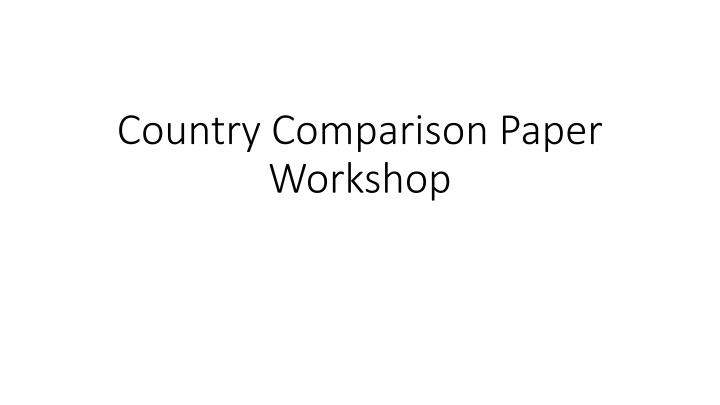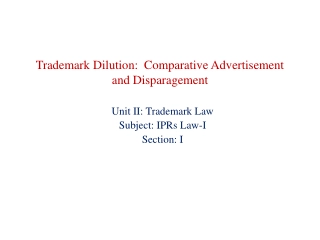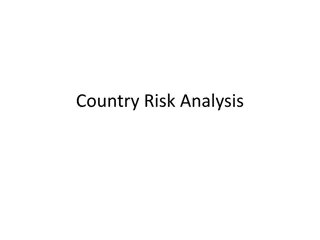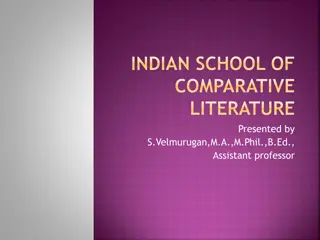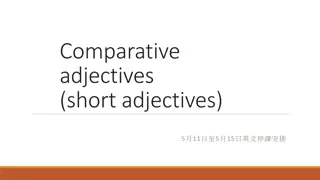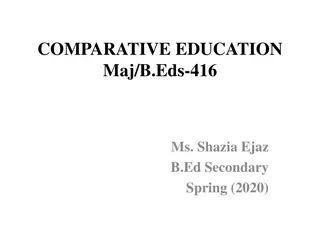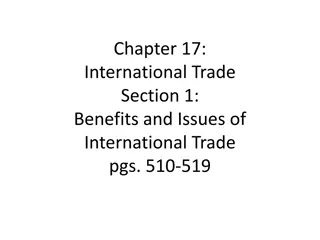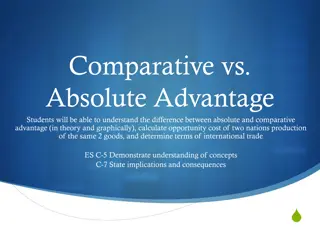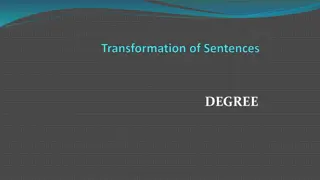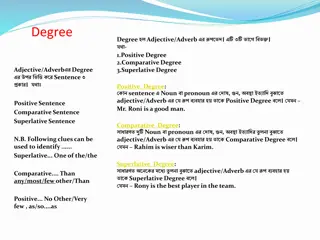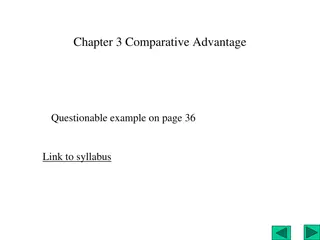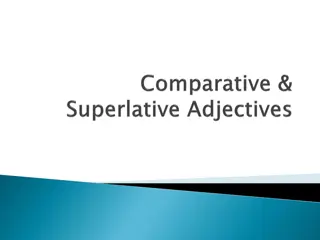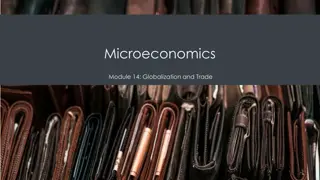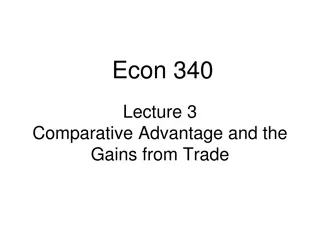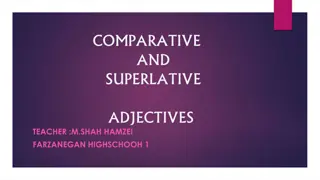Comparative Analysis of Country Development Levels
This workshop requires a comparative analysis of two countries excluding the ten countries covered in the course and the United States. It involves evaluating population size, ethnic composition, economic development level, regime type, institutional design, electoral rules, party system, and major policy trends. The first part focuses on comparing the selected countries based on various criteria, while the second part involves analyzing the findings. Definitions of economic development levels are provided to guide the comparison process.
Download Presentation

Please find below an Image/Link to download the presentation.
The content on the website is provided AS IS for your information and personal use only. It may not be sold, licensed, or shared on other websites without obtaining consent from the author.If you encounter any issues during the download, it is possible that the publisher has removed the file from their server.
You are allowed to download the files provided on this website for personal or commercial use, subject to the condition that they are used lawfully. All files are the property of their respective owners.
The content on the website is provided AS IS for your information and personal use only. It may not be sold, licensed, or shared on other websites without obtaining consent from the author.
E N D
Presentation Transcript
Country Comparison Paper Workshop
Counter Comparison Paper Overview You may select any two countries EXCEPT for the ten countries (United Kingdom, France, Germany, Mexico, Brazil, Russia, China, India, Nigeria and Iran) we cover in this course and the United States This is an evaluative research paper, which means first, you present facts and information and then evaluate and interpret them. Your paper has two parts. In the first portion of the paper you will compare and contrast these two states In the second part, you will provide an analysis
1stPart: Country Comparison of the two states In the first portion of the paper you will compare and contrast these two states in terms of their population size ethnic composition level of economic development, (developed, developing, undeveloped) regime type (democratic, authoritarian, totalitarian, theocratic) institutional design (federal, unitary, presidential, parliamentary, monarchy) electoral rules party system (including number of parties, ruling party and main opposition parties) major policy trends within that state (current political events in that country within the last 5 years) On information about major policy trends, please go to freedomhouse.org and countrywatch.org.
Definitions of Levels of Economic Development 1) Developed Countries These are the world s countries that are considered to be at the highest social and economic levels. Economic Dev. is largely based on the service sector and less on the industrial and manufacturing services. Social Dev. Well developed education system - Well developed health care system - Well developed banking, transportation and information technologies (Ex. USA, UK, France, Germany, Australia, etc.) 2) Developing or Newly Industrialized Countries These are the world s countries that are going through the process of becoming developed. These countries have undergone enormous changes such as new government regimes and the gaining of independence. This process can take many years. - Since WW2, Taiwan, S. Korea, Hong Kong and Singapore have become developed. - Currently, countries such as China, Malaysia, Brazil, India, and Russia are considered to be developing. - Economic Dev. is transitioning from a focus on industrial and manufactured based sectors to service sectors. Social Dev. Education, health care, banking, transportation and information technologies are all developing. 3) Undeveloped Countries These are the world s countries that are considered to be at the lowest social and economic levels. (Most of Africa, Papau New Guinea, East Timor, etc.) Economic Dev. is largely based on primary services such as agriculture. - Most new development is focused on the manufacturing sector as these countries often have the raw materials needed (e.g. mining, forestry) - There is little service sector as people have little to no money to spend. Social Dev. Education, health care, banking, transportation and information technologies are almost nonexistent as governments do not have the money to invest into these sectors as people are often too poor to pay taxes. - Governments often rely on foreign aid to pay for these social developments. - As such, what little money the government does make, often goes to repayment of these loans instead of their own people.
2ndPart: An analysis of the comparison of the two states The institutional designs (you can find world constitutions on www.constituteproject.org) and Political culture has impacted political outcomes in these countries
Institutional Design Analysis When writing about institutional design, consider the structure of the government, whether federal, unitary, presidential, parliamentary, semi-presidential, discuss how the structure of the government can affect how political events have unfolded in your selected countries. Ex: Parliamentary democracy in the UK: The UK prime minister gets involved in a scandal in his political party. His political party has a majority in the House of Commons so it is unlikely that his political party will turn against him because it could mean the fall of the government and early elections being called. The prime minister could be replaced as a result. Ex: Absolute monarchy in Saudi Arabia. Protests against the royal family in Saudi Arabia would probably result in a mass crackdown against the protest leaders and possible mass detention against supporters of the protests.
Institutional Design Analysis: The United States The United States having a federal, constitutional government with systems of checks and balances and separation of powers can strongly affect the outcome of public policy and political decisions. For the federal government to get anything done, you need the separate branches to cooperate with implementing public policy with Congress passing new legislation and the President signing the bill into law. The courts can affirm the constitutionality of the law if challenged in the court system, or rule that various laws are unconstitutional. The Constitution establishes strong limitations to what government can and can t do to its citizens through the Bill of Rights. That limits the government s power on its citizens and preserves protection of American personal liberty.
Political Culture Analysis Remember the definition of what political culture is: a set of attitudes and practices held by a people that shapes their political behavior. It includes moral judgments, political myths, beliefs, and ideas about what makes for a good society. In addition: defining events, experiences (especially those that last for years), and socialization. The latter is defined as the process of transmitting values and systems of meaning, usually from one generation to the next. Components of Political Culture Beliefs about Authority Group versus Individual Liberty versus Security Political System Legitimacy The Political Community
Examples of Political Culture from the TIC Countries and the United States The UK: less collectivistic than rest of Europe; working class deference; Germany: Principle of subsidiarity; regional differences in legitimacy France: Importance of merit-based hierarchies; (secularism) India: Heterogeneous culture; trust in individuals more than government institutions Mexico: Acquiescent to elite rule but admiration of revolutionary figures; fairly strong attachment to overarching identity Brazil: Values supportive of nondemocracy; low levels of system legitimacy; Nigeria: Regional differences in culture, but general lack of system legitimacy and weak attachment to overarching national identity Russia: Collectivistic and deferential to strong leaders; legitimacy linked to performance China: Legacies of Confucianism; order and security over freedom; values changing with decades of capitalist development Iran: Order and security over freedom (but less so than in other Middle Eastern countries); more individualistic and prodemocratic values among young urban residents United States: Political Culture emphasizes the values of liberty, equality, and democracy. Sharp differences in American society on how those values should be defined. Ex. Political and social equality vs. economic equality. Personal liberty vs. national security.
One more example of Political Culture: Japan Japan is a constitutional democracy; after World War II, officials from the United States wrote the country's constitution. In Japan, however, good relations and harmony are considered much more important than in the U.S. The concept of hierarchy, both familial and political, is deeply rooted in Japanese political culture. In comparison to Americans, the Japanese demonstrate more respect for authority, as evidenced by their interactions with elder family members and leaders.
3rdPart: Comparing and Conclusion Which country do you think has the better institutional design and political culture that affects the outcome of political and social events and why? Conclusion of the two countries and where do you think both countries are going in terms of political development in the next decade.
Research Paper Writing Process Brainstorming and exploring countries of interest Prewriting Drafting Revising Editing Reviewing Final paper done and turned in.
Research Sources: Freedom House and CountryWatch CountryWatch: CountryWatch is an information provider for corporations, government agencies, universities, schools, libraries and individuals needing up-to-date news and information on each of the recognized countries of the world. CountryWatch provides critical country-specific intelligence and data to over 4000 clients including public and private sector organizations with overseas operations and global interests. In addition, CountryWatch provides country information to large media audiences in various venues as part of its media strategy. It can be accessed through the L.A. Mission College Library of Databases at the above link. Freedom House: Freedom House is a U.S.-based non-governmental organization that conducts research and advocacy on democracy, political freedom, and human rights. They provide annual reports each year on every country in the world on the improvement and reduction of political rights and civil liberties. This is a great resource for contemporary comparison of your selected two countries. https://freedomhouse.org/
Questions I have received regarding the Research Paper in recent semesters How many resources do I have to use on my paper? There is no set amount of sources to use. Can I use newspaper articles as research sources? Yes you may. Can I interview experts on my topic for research? Yes you can. Can the paper be longer than 10 pages? It may if it is absolutely necessary. Can the paper be shorter than 6 pages? No, it can t otherwise points may be deducted. How many times can I send you a draft version of my paper? As many times as you like. Do I have to do the research paper assignment? Yes you do but I can t make you do anything. What happens if I skip doing the research paper assignment? You get a zero on the assignment. Can the paper be late? Yes, if there is a legitimate reason. Please contact me if you need an extension on your paper. Do you like pie? Yes I do. I like peach pie.
